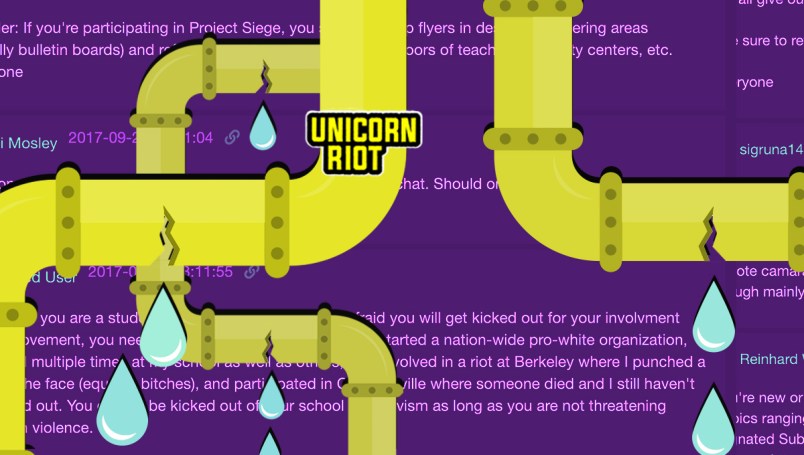Unicorn Riot didn’t set out to target white nationalists.
The “decentralized” non-profit media collective was founded in 2015 to highlight social justice-oriented stories often overlooked by the mainstream media: police brutality, indigenous rights, queer activism.
Over the past 18-months, though, Unicorn Riot’s leaked internal communications of white nationalist groups have become a valuable resource for those focused on the danger posed by far-right extremism. The leaks were a “gift,” according to the attorneys seeking to sue these groups for their well-coordinated plan to commit violence at the 2017 “Unite the Right” rally. They’ve helped journalists and anti-hate organizations reveal how white nationalists have rallied in support of Rep. Steve King (R-IA) and worked to infiltrate the Republican Party from the ground up.
Members of Unicorn Riot told TPM that’s exactly the kind of work they hoped to make possible through their searchable, open source database.
“Instead of giving a small piece of the picture, we can give such large data sets that in some cases can completely change how a specific issue is seen,” Dan Feidt, a Unicorn Riot co-founder based in Boston, told TPM.
“By putting information out there that helps determine who these people are, what their motives are, what their plans are, how they’re trying to drag more people into their world, that affects their recruitment and I think makes people who might consider this be a lot more reluctant to join,” Feidt continued. “All of that has a huge impact on their ability to function as organizations.”
Unicorn Riot consists of some 20 people dispersed across cities from Philadelphia to Minneapolis to Berkeley. The core group is mostly composed of coders, journalists, web developers and former activists ranging in age from their mid-20s to late-30s. Many connected years ago, working on video projects protesting the 2008 Republican National Convention and supporting Occupy Wall Street. They work on the site in spare time outside their day jobs, uploading videos from cafes and working nights to improve the databases’ functionality. Their efforts are aided by a network of volunteers and sources.
Despite their clear stance on the social issues they cover, the organization eschews the “activist” label, citing their reliance on traditional journalistic techniques.
Feidt told TPM that Unicorn Riot’s attention to the far-right came into sharper focus in 2015, after a white supremacist opened fire at a rally protesting a fatal police shooting in Minneapolis they were covering, injuring five protesters.
From there, they covered the raucous white nationalist rally in Pikeville, Kentucky, in April of 2017, and dispatched several members to Charlottesville, Virginia for the event scheduled to take place there that August.
En route to the “Unite the Right” rally, a Unicorn Riot member started receiving screenshots of real-time communications from the white nationalist, neo-Nazis, and neo-Confederates who planned the two-day event that roiled the college town, leaving dozens injured and counter-protester Heather Heyer dead.
Private chats exchanged on the popular gaming platform Discord and provided to Unicorn Riot by a source showed attendees coordinating the event weeks in advance. The messages, later posted on Unicorn Riot’s website, included photographs of attendees posing with the weapons they planned to bring and talking in graphic terms about their plans to engage in violence at the event—and even run over counter-protesters with cars.
Those chats were cited in two federal lawsuits later brought against groups like Identity Evropa, the National Socialist Movement, and the League of the South for engaging in premeditated paramilitary activity in the city’s streets. They were “key” to the suit brought by Integrity First for America, executive director Amy Spitalnick said Thursday.
The leaks have kept coming ever since. Their sources range from infiltrators who proactively gain access to hate groups’ servers to disgruntled white nationalists eager to rat on their former allies, according to Feidt and Freddy, a West Coast-based computer programmer-turned-journalist who asked to be identified solely by his first name. They declined to go into detail on their methods, but said the tech backgrounds many of them share help them “scrape” the servers they gain access to and build user-facing databases of the material they obtain.
Most recently, Unicorn Riot released tens of thousands of Slack and Discord messages exchanged by members of Identity Evropa, a racist hate group that disbanded in the wake of the leaks.
Freddy, who spent months working on the Identity Evropa project, said that filtering the noise out of these enormous data troves grows easier with time.
“I’ve read probably almost a million chat messages,” he said. “I hate to say it, but that’s probably true. After that you just kind of get a sixth sense for who the main influencers are.”
One of the most jarring realizations about studying these groups, Freddy said, is “just how professional a lot of these people are. It’s depressing when you see that it’s EMTs, and teachers and things like that.”
The database is useful for smaller-scale research, too.
Feidt recalled a recent message Unicorn Riot received from a woman who said, “‘Hey, I think my niece might be dating a white nationalist, and I think I found him ‘cause his email address is similar to his Discord address.’ When she went looking, she found that his photos matched in the Discord leaks with his actual appearance. And she was able to get her niece to stop dating that guy.”
That’s the point of Unicorn Riot’s work, as Freddy put it. “Making it harder” for white nationalists to operate—be it romantically, professionally, or just within their network of hate groups.






